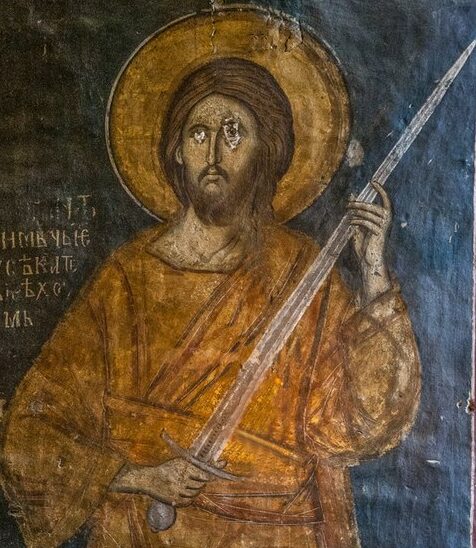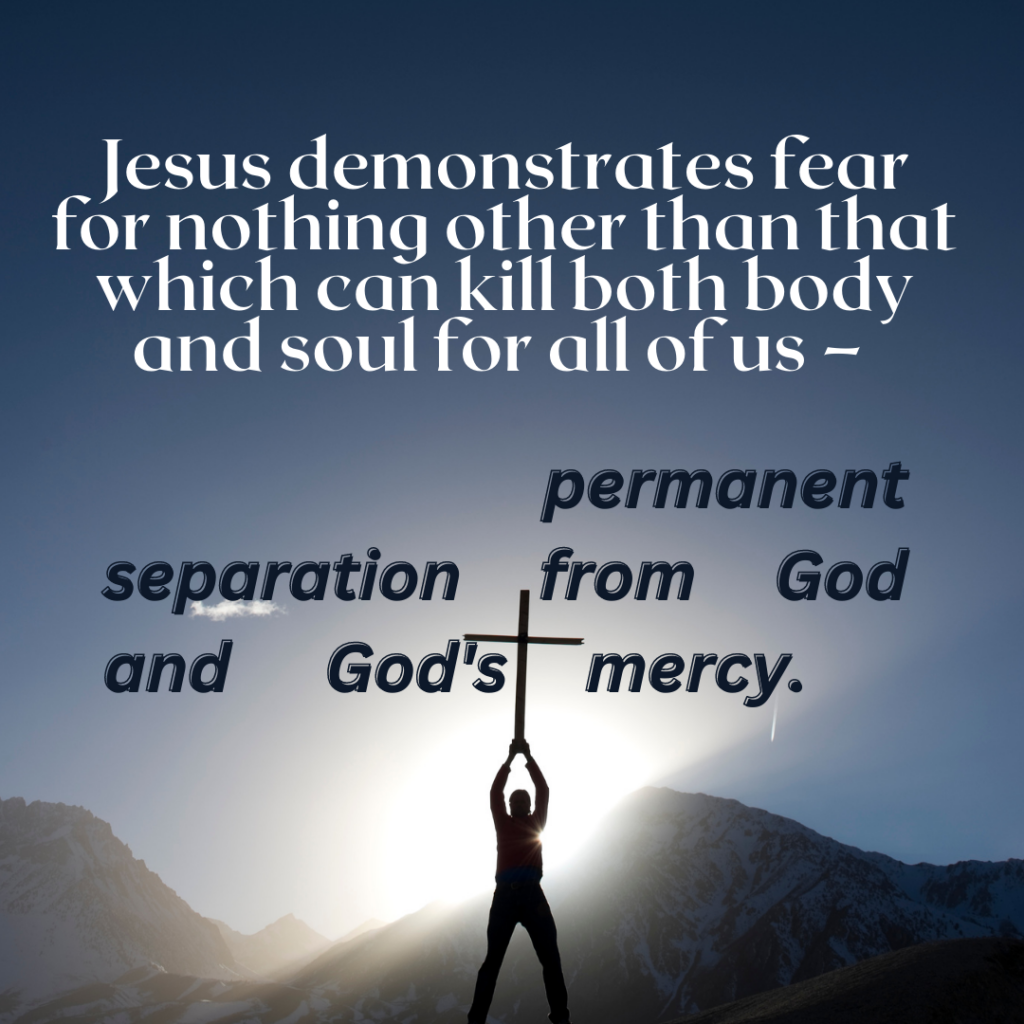Merciful Love in a Time of Conflict
Matthew 10:24-39
Fourth Sunday after Pentecost
Analysis by James Squire
24“A disciple is not above the teacher, nor a slave above the master; 25it is enough for the disciple to be like the teacher, and the slave like the master. If they have called the master of the house Beelzebul, how much more will they malign those of his household! 26“So have no fear of them; for nothing is covered up that will not be uncovered, and nothing secret that will not become known. 27What I say to you in the dark, tell in the light; and what you hear whispered, proclaim from the housetops. 28Do not fear those who kill the body but cannot kill the soul; rather fear him who can destroy both soul and body in hell. 29Are not two sparrows sold for a penny? Yet not one of them will fall to the ground apart from your Father. 30And even the hairs of your head are all counted. 31So do not be afraid; you are of more value than many sparrows. 32“Everyone therefore who acknowledges me before others, I also will acknowledge before my Father in heaven; 33but whoever denies me before others, I also will deny before my Father in heaven. 34“Do not think that I have come to bring peace to the earth; I have not come to bring peace, but a sword. 35For I have come to set a man against his father, and a daughter against her mother, and a daughter-in-law against her mother-in-law; 36and one’s foes will be members of one’s own household. 37Whoever loves father or mother more than me is not worthy of me; and whoever loves son or daughter more than me is not worthy of me; 38and whoever does not take up the cross and follow me is not worthy of me. 39Those who find their life will lose it, and those who lose their life for my sake will find it.

Icon of Jesus holding a sword – Visoki Decani (The face was disfigured after the Ottoman conquest of 1455 and later partially restored.) Public Domain from https://commons.wikimedia.org/
Jesus shows no fear toward Jewish officials who disagree with his ministry. He shows no fear toward the many demons that he finds enslaving people as he goes about his ministry. Even the tempter does not have him shaking in his boots. But losing his chance to connect people to the kingdom of heaven? That is his one fear, and he puts it to rest by dying the one death that leads to resurrection for all and giving his victory to the lost sheep of every house (28:18-20).
Author’s Note: The community to which Matthew writes is going through something that undoubtedly includes strong partisan emotions. This text is surrounded in chapter 10 on the one side by the commissioning and the sending of the disciples “like sheep into the midst of wolves” (in Matthew, only “to the lost sheep of the house of Israel”), and on the other side by a short, pithy statement about what kind of welcome they should get (in contrast to the one they are likely to get). The Jesus we get from the writer grates a bit.
Of course, later in Matthew’s gospel, Jesus gets his comeuppance from the Canaanite woman (15:22-28) for his exclusionary edict, and in the end the ministry of Jesus was widened to include all people.
DIAGNOSIS: Ministry in Our Hands and by Our Whim
Step 1: Initial Diagnosis (External Problem): Ministry Neglected
The ministry of Jesus is threatened by rivalries. When people compare their worth with colleagues and even with their leaders, it gets in the way of the mission: proclaiming the kingdom of heaven, curing the sick, raising the dead, cleansing the lepers, casting out demons, and all without payment (10:7-8). And yet, Jesus seems resigned to the inevitability of such rivalries and divisions. Almost as if he knows us all too well.
Step 2: Advanced Diagnosis (Internal Problem): Ministry Swallowed by Fear
Underneath the inevitable divisiveness lies misplaced fear. We live in darkness, which Jesus is desperately trying to pierce (v. 27). In the dark, we conjure up all sorts of imaginary threats. Our imagination fills in the blanks if no one else will. Is there someone out there who can destroy both our body and our soul in hell (v. 28)? That is the one who should be feared, but instead we conjure enemies who threaten us physically (when we are not waging war to defend our bruised egos, that is), but cannot threaten our soul. The world seemingly does not have to threaten our soul, because we are too eager to abandon it in pursuit of our cultural or political wars. Our value to God (vv. 29-31) is lost on us because we are so caught up in the divisive rivalries that swirl in our world. We love our tribe more than we love Jesus (v. 37), even though the tribe is frayed (vv. 35-36) and falling apart.
Step 3: Final Diagnosis (Eternal Problem): Nothing to Acknowledge before the Father
Underneath the misplaced fear is God and his sadness at what he sees going on with us. God sees the value he places in us being wasted in destructive behavior. He sees us clutching hold to a life without God that will inevitably slip through our fingers (v. 39). Matthew quotes Jesus saying if we deny him before others, he will deny us before his Father in heaven. Even if that is not literally true of Jesus and God, at this point in the narrative, what exactly is Jesus supposed to say about us when he stands before his Father in heaven? Is there anything good he can report?
PROGNOSIS: Ministry in the Hands of God through Us
Step 4: Initial Prognosis (Eternal Solution): Jesus Is Our Good Acknowledgement
But Jesus is not yet standing before his Father in heaven in Matthew’s narrative. There is an important journey ahead of him before he ascends to the Father. Jesus demonstrates fear for nothing other than that which can kill both body and soul for all of us – permanent separation from God and his mercy. He shows no fear toward the occupying force that executes dissidents in full view of the public just outside Jerusalem. He shows no fear toward Jewish officials who disagree with his ministry. He shows no fear toward the many demons that he finds enslaving people as he goes about his ministry. Even the tempter does not have him shaking in his boots. But losing his chance to connect people to the kingdom of heaven? That is his one fear, and he puts it to rest by dying the one death that leads to resurrection for all and giving his victory to the lost sheep of every house (28:18-20). Then he can return to heaven, stand before his heavenly Father, and give a joyous report about his exploits on our behalf.
Step 5: Advanced Prognosis (Internal Solution): Ministry Resurrected through Faith in Jesus
If you were a disciple of Jesus in Matthew 28, would you want to place yourself above your teacher (v. 24)? Of course not! We would not consider it. Moreover, in the darkness that still engulfs our world, we have amazing news to shine our light on (v. 27) and to share openly. The blessing of the resurrected Jesus for restoring lost sheep to God is now a message that is entrusted to us. It is a message we can trust about ourselves and each other because it comes from the one who defeated sin and death. Our body and our soul are safe in the resurrection of Jesus. Through that resurrection, we see that our Father in heaven truly does value us (v. 31).
Step 6: Final Prognosis (External Solution): Ministry Embraced
Rivalries abound and divisiveness shows no sign of slowing down or diminishing. But the kingdom of heaven has been planted in us to help us remain focused on sharing it with others, offering healing to those who need it, and all without payment. We are sent out with the same holy fear that Jesus had among us: to rescue those who fall through the cracks, abandoned by the world.




You must be logged in to post a comment.